As much as I wish I could say the bags under my eyes are Chanel, that is the furthest thing from the truth. In fact, these bags are a result of sleep deprivation. Or at least they were – you see over the past month I’ve completely changed the way I think about sleep and have managed to improve my sleep health and say goodbye to the bags! I’ve gone from drinking more iced coffees than water to waking up feeling energised. New sleep cycle, who dis?
A lot of this recent change has got to do with moving in with my boyfriend Justin, it’s my first time sharing a bed 7 days a week which means getting a good night’s sleep has been more important than ever. So with a few mindful sleep strategies (backed by science), a new mattress (more on that later) and a whole lotta old fashioned knowledge, here is a list of practical steps that you can consciously take to ensure you’re having better sleep – rather than letting your head hit the pillow and hoping.
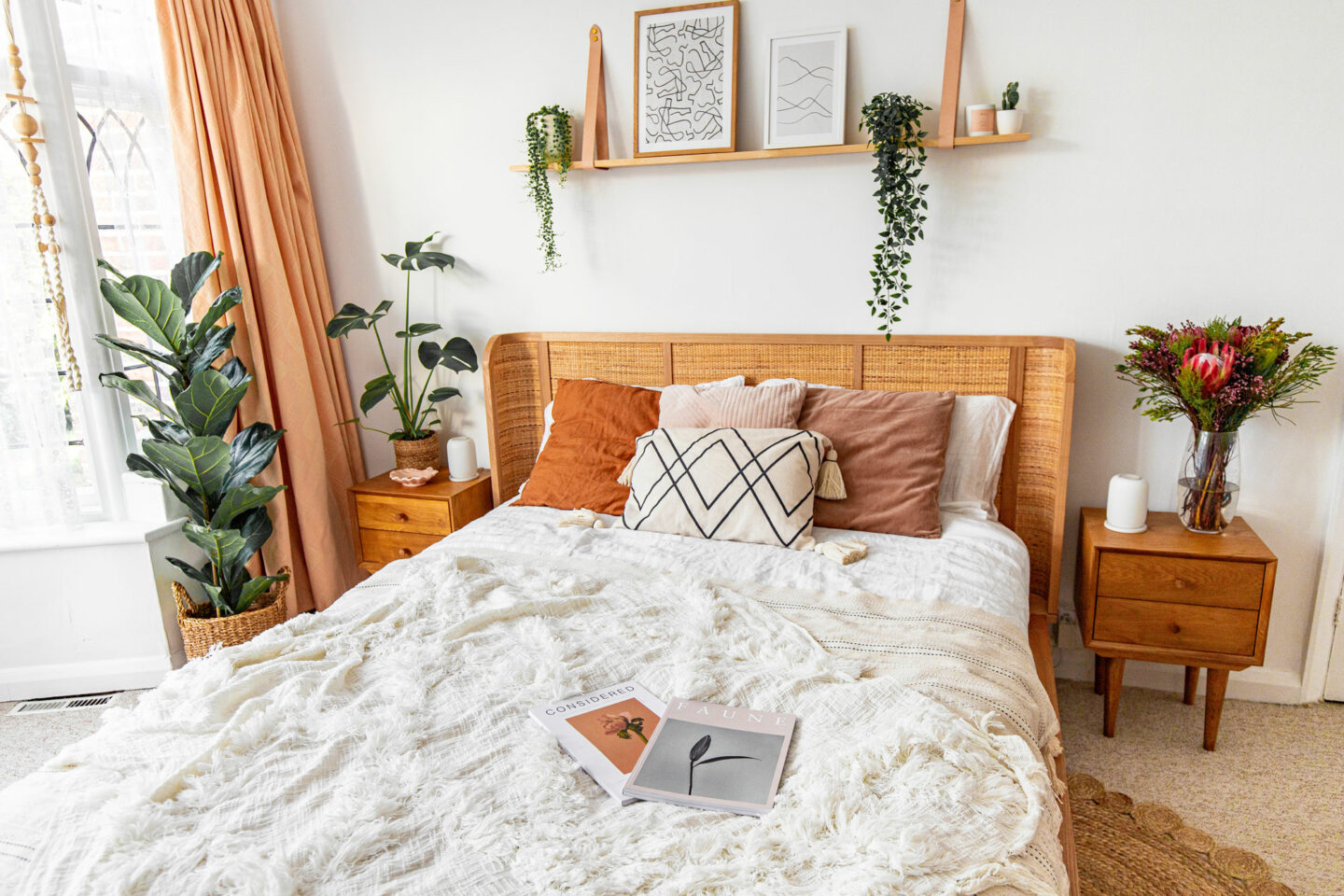
The science behind the zzz’s!
Before we get into the tips for sleep here’s a little bit on the science behind the zzz’s!
As humans, our body naturally has a function to help us sleep called our Circadian rhythm – think of this as your body’s natural alarm clock, keeping us awake for an amount of time and then helping us drift off to sleep. Back in the day, the only thing that helped our body to keep this rhythm was the sun rising and falling – but now we get less sunlight exposure (thanks London!), we are exposed to a lot more artificial light due to modern technology. Because of this, we have gotten far worse at regulating our sleep patterns.
Why do we really need sleep? There are different stages of sleep that do different things for our body and mind. Light sleep is the first stage of sleep we enter but it’s the other two sleep cycles that give us the real benefit.
Deep sleep: This phase is critical for renewal and repair of the body helping our muscles regenerate and helping our immune system to be restored.
REM sleep: Rapid Eye Movement sleep is responsible for aiding the mental and emotional functions of our brain. Without this stage of sleep, we would struggle to commit new experiences to memory, learn new skills, regulate our reactions to people, and more.
Here’s the scary but important truth about sleep: those who on average sleep 6 hours instead of 8 hours per night are more likely to: have relationship issues, lose their job, have a heart attack, develop cancer, die younger and suffer from depression. Long and short of it – people who make sleep a priority live longer, and live much more happy fulfilling lives whilst they are here!
With that in mind, here are 10 essential tips for getting better sleep!
10 ways to get better sleep
1. Build your sleep habit
The wealth of scientific literature on the topic of sleep indicates that having a regular bedtime and wake up time is the most powerful indicator of a good night’s sleep and subsequently increases productivity, emotional wellbeing and life expectancy. Having a cheeky lie on the weekends will unfortunately not help you recover from inconsistent and deprived sleep during the week – sleep debt is real and you pay it back with interest.
Set yourself a sleep alarm. Most people are just about ok with the logic of a wake-up alarm despite how many people want to smash their alarm clock or bury their phone under the mattress, never to be seen again. However, setting yourself an alarm 1 hour before bed can help you mindfully think about the habit when you’re already conscious and use that as a trigger to start to power down. I love using the app Sleep Cycle as their intelligent alarm clock is designed to gently wake you up while you’re in your lightest sleep phase.
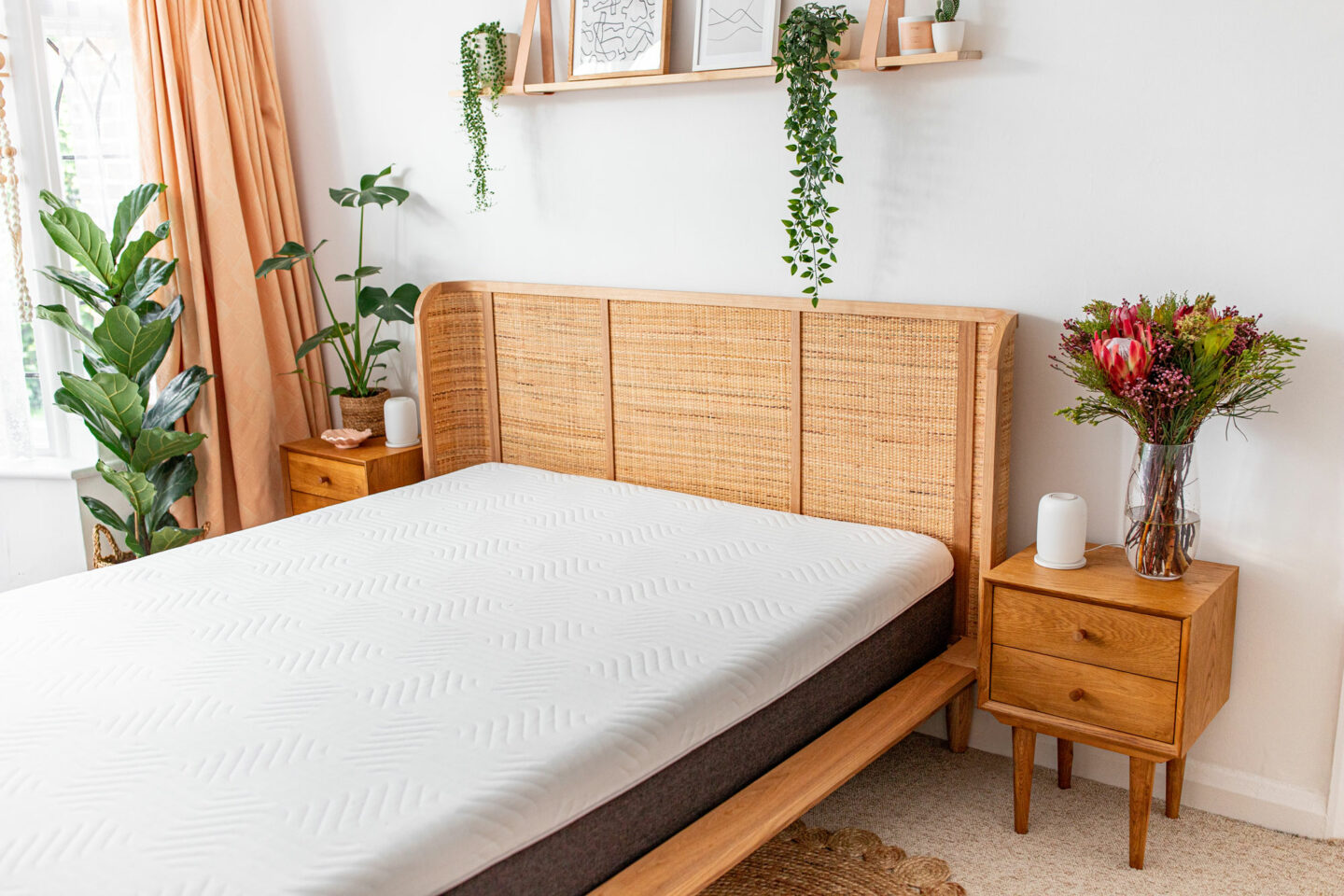
2. Invest in what you sleep on
If sleep is natures greatest healer, then the mattress you sleep on is one of the most powerful tools in the medicine box. It doesn’t matter how early you go to bed – if you can’t find a comfortable position because your mattress is older than the paint on your walls, then you will struggle to get that restorative night of healing you so desperately need!
For the past month, I’ve been sleeping on my idyll mattress (kindly gifted) and it’s been a real game-changer when it comes to my sleep health. Their mindful mattress is designed and engineered to help you get a perfect night’s sleep with its cooling gel technology, a unique combination of micro and pocket springs for extra support and 6 layers of comfort that suits everyone’s needs.
Sleeping on my idyll is the first time I’ve experienced non-interrupted sleep. Previously I was waking up several times throughout the night due to my partner moving next to me, our old mattress was too lumpy and it constantly felt like I was about to fall off. With idyll‘s edge-to-edge support (a specially engineered foam F-joint that reinforces the overall strength of the mattress), I’m able to sleep undisturbed, my side of the mattress doesn’t budge even when boyfriend jerks and twitches throughout the night.
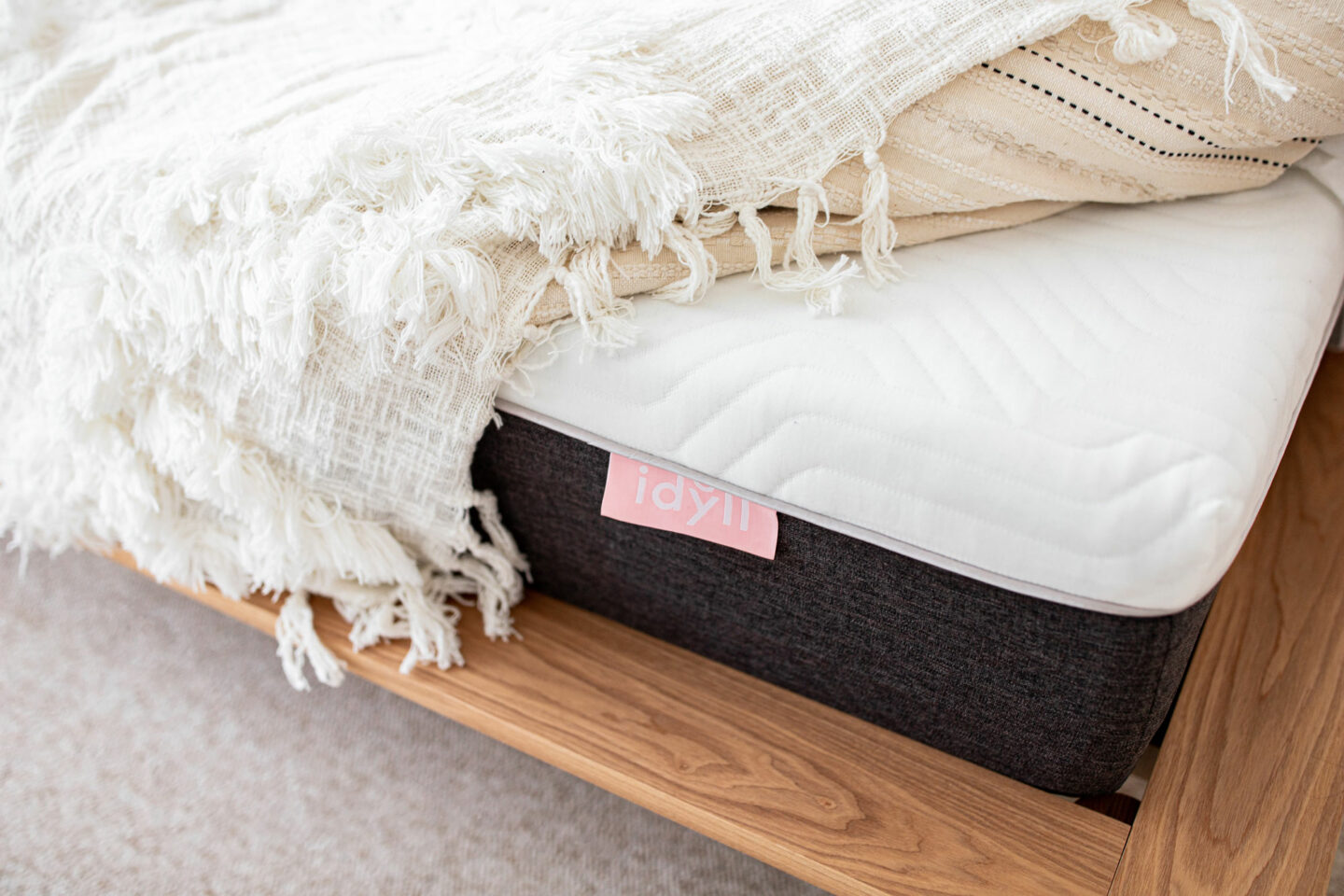
Your bed should be your sleep haven and considering it’s where we spend almost a third of our lifetime, then it’s definitely worth investing in a mindful mattress, your body (and mind!) will thank you for it. If you’re feeling lucky, I’m actually giving away an idyll mattress over on my Instagram, to enter: CLICK HERE.
3. Power down
Now we’ve heard about our sleep alarm what next? One major development in technology and a huge part of our issues with sleep was the development of electronics with blue wavelength light. You’ve probably heard a million people say that looking at your laptop or phone before bed isn’t good for you… but you probably haven’t heard why.
The light from computer screens, televisions, and phones can hinder the production of melatonin, which means your body isn’t preparing the hormones it needs to enter the sleep phase. One study revealed that those who chose to read a physical book one hour before bed versus people who read on a blue light-emitting device had significantly less disrupted sleep.
As much as you’re addicted to checking notifications and watching Tik Tok videos – this addiction can be causing you serious long term damage to your health and happiness.
There are now several apps for phones and other devices that help filter out blue wavelength light which you should trigger to activate at least 2 hours before you go to sleep, if not earlier. This will help reduce the impact of the blue light on hormone production.
Bonus strategy: it’s not just blue wavelength light that can harm your sleep, if you have blinds or thin curtains you’ll probably be letting a lot of unnatural street light and morning sun in your room, which doesn’t help at all. Buy some good quality blackout curtains to help keep your room as dark as possible. Side note: this is my favourite and most comfortable eye mask I’ve tried and it will help to improve your sleep quality significantly by keeping light out.
4. Get the office out your bedroom
Your external environment is a huge predictor in any given situation. Your sleep environment is no different.
If you allow your bedroom to be a hub of random activity, especially activity that isn’t going to help you relax, then you probably won’t build a strong neuro-association with sleep. If you usually watch Netflix in bed every night – when you curl up, your brain will crave the next episode of Stranger Things even if you’ve binged the whole thing already!
So what can you do to trick your brain and create a harmonious sleep-inducing space? Get the office out of your bed! I know getting a dedicated office space as a young professional is very rare. For those office workers and freelance WFH’ers it’s often tempting to bang through some emails in bed or write your work to-do list on your bedside table BUT if there’s one tactic you can use to improve your sleep environment, it’s to separate your bedroom from any work.
For a lot of people checking emails outside of work hours increases anxiety and stress. Even if it does elevate stress momentarily by “sending that urgent presentation” your brain is now in work mode – firing all cylinders – this is not what you want when you’re about to drift off.
If you have access to another room in your property, then use this space as a dedicated work area. Now if you’re having to work late at home and if you’re in a shared living environment or you live in a studio space – try your best to find a space separate from your bed. Even a chair on the other side of the room will help you mentally separate your working neurons to your relaxing neurons.
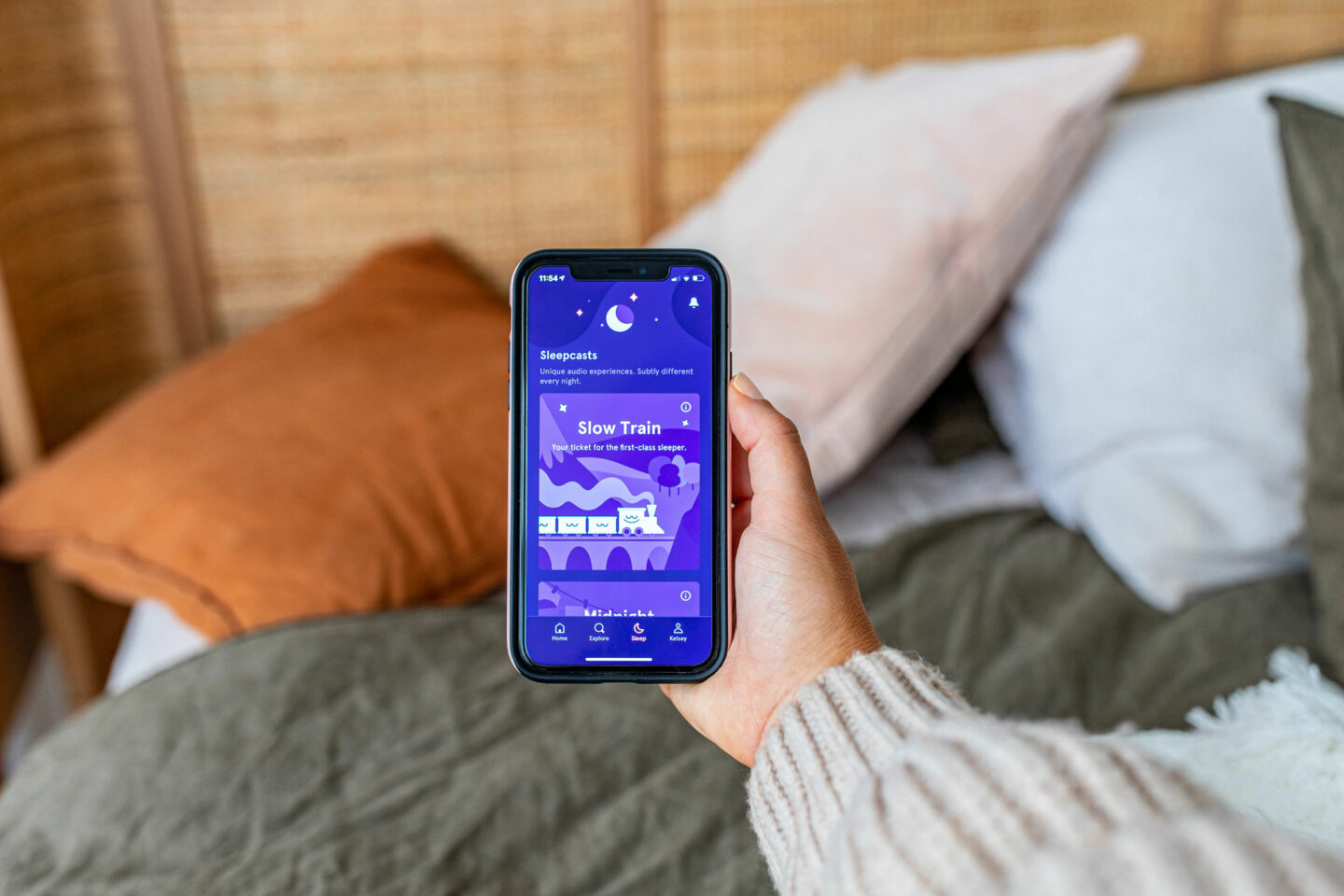
5. Relaxation & reproduction
Weeeellllll maybe not exactly reproduction (especially if you’re not ready for a miniature you to be running around), however, sex has been shown to have a huge impact on people’s sleep so if you’re not regularly getting it – get to it!
When we have sex, our brains release a variety of hormones that have the byproduct of relaxation and sleepiness. Number one of which is called Oxytocin aka “The Love Hormone”, which we experience an increased release from the brain when we give and receive affection, sexual touch and orgasm.
The other thing we should be doing in bed before sleep is to relax! As previously mentioned, reading a physical book before bed has been shown to help improve sleep. Meditation is key for a pre-bed relaxation ritual too. By practising meditation and quieting the mind, you create physiological changes that are similar to those that happen in your body during the early phases of sleep, such as your pulse slowing, blood pressure dropping and stress hormones decreasing.
For some, meditation can seem somewhat daunting and perhaps a bit odd? Honestly, that’s how I felt at first. Which is why I love the app Headspace as they have a range of “sleep casts” that will guide you through a quick meditation process and help you wind down for sleep.
6. Cool it down
The body will naturally, through thermoregulation, bring down our core body temperature to help initiate sleep. The hotter things are in your bedroom, the harder it will be to drift off! Luckily for those in the UK, it’s starting to chill right down in the evenings now. But for those of you still in hot climates and have the luxury of air-con – aim to get the room temperature down to 18-21 degrees – which has been proven to be the best temperature for sleep. For those without aircon: investment in a decent tower/ceiling fan will make a huge amount of difference.
Next look at switching up your bedding, linen sheets are not only eco-friendly and super comfortable, but they also help regulate your body temperature while you sleep to ensure you’ll be comfortable during the night. And lastly: if you don’t have any of these options at your disposal, try losing the duvet/sheet altogether and sleeping in your Birthday suit – which has also been proven to improve sleep quality.
7. Exercise
You are probably at some level aware of the benefit of exercise on your sleep. However is it the exercise itself giving you more energy or is it the impact that exercise has on our sleep? Well, it’s complicated but many studies have found that exercising earlier on in the day has lead to significant improvements in sleep quality. Researchers found those who worked out at 7 am slept longer and spent on average 75% longer in the deep sleep stage than people who worked out at 1 pm or 7 pm.
This is also a great time to workout for people who work 9-5 and who often don’t get back home from work until later in the evening. Accomplishing something physical early in the morning gives me that psychological edge throughout the day. In meetings, I’m sharper, when I’m creatively solving a problem I think bigger, and I’m often far more entertaining and energetic when I’m with my friends and family as a result.
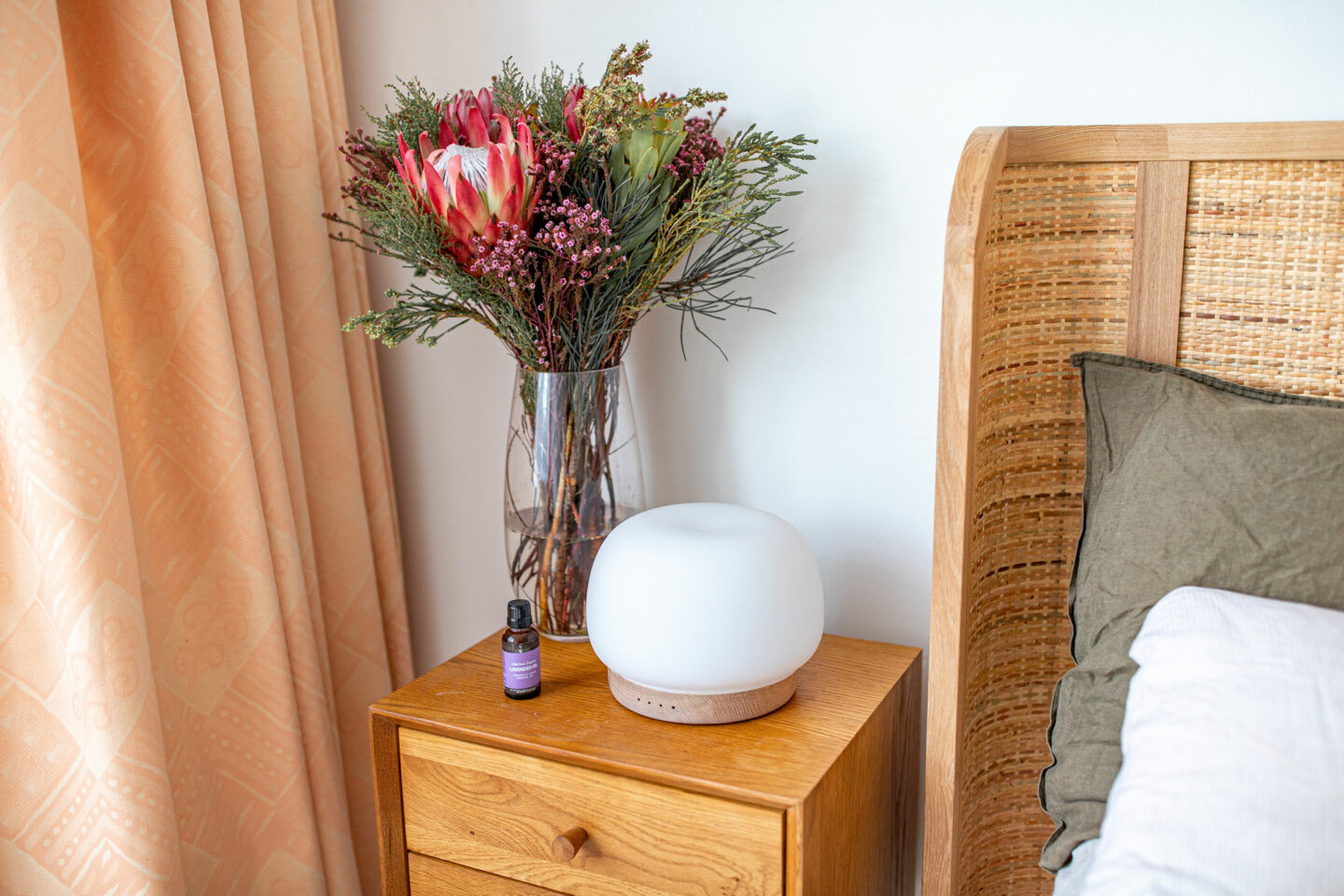
8. Stock up on sleep aids
We’ve already discussed why investing in a quality mattress will change your sleep life. Blackout curtains and eye masks help to create an ideal light setting for sleep. So what else can help lull you to sleep that doesn’t involve medication?
Say it with me: aromatherapy. Several studies show that simply smelling lavender oil for 30 minutes before bed may be enough to improve the quality of sleep. Consider buying a diffuser with a timer, so you don’t have to worry about switching anything off after you fall asleep.
Here are some more recommended products to keep in your bedside table. This Works Deep Sleep Pillow Spray is a game-changer, this award-winning product will help reduce sleep anxiety and improve sleep quality – just spray a few times over your pillow. Drinking Passion Flower Tea before bed can improve sleep quality – look for a blend with chamomile to make you feel extra calm.
And lastly, a white noise machine might sound absurd, but if you’re used to sleeping with a fan on year-round like me, white noise helps to drown out sounds (aka your snoring partner or traffic on the street) which might otherwise prevent you from either falling asleep or waking up whilst asleep. Don’t knock it til you try it.
9. Avoid caffeine and alcohol before bed
You may well be thoroughly addicted to coffee by now and you might be thinking that having your final 4 pm coffee to get through the day isn’t harming your sleep. Well, sadly that’s not what is happening. Caffeine has a “half life” (a term for the length of time that will have surpassed when half of a drug is still active in your system) of 4-5 hours! So if you have a mid-afternoon coffee at 3 pm, that means that half of that Coffee could still be active at 8 pm, meaning your body won’t be rid of the effects of Caffeine until potentially 1 am!
Your sleep is the real loser here. One study found participants who had a coffee 6 hours before bed had on average 1 hour less sleep than those with no coffee. No one is expecting you to drop the java all together. I wouldn’t wish that on my worst enemy but think about trying to reduce your cups gradually – and most importantly try to limit your caffeine intake after lunch to avoid the loss of sleep.
But Kelsey, surely, I can have a glass of red before bed to relax and wind down? Much as I love indulging in a cheeky Malbec, studies have shown that although you do fall asleep faster after a drink than when sober, you have significantly less deep sleep and critically Rapid Eye Movement sleep. REM Sleep is associated with memory processing – when you go to bed drunk and you lose this sleep, your brain can’t accurately put the memories gained whilst awake into long term storage. That’s why you can’t remember fist-pumping to Old Town Road on a tabletop from last night!
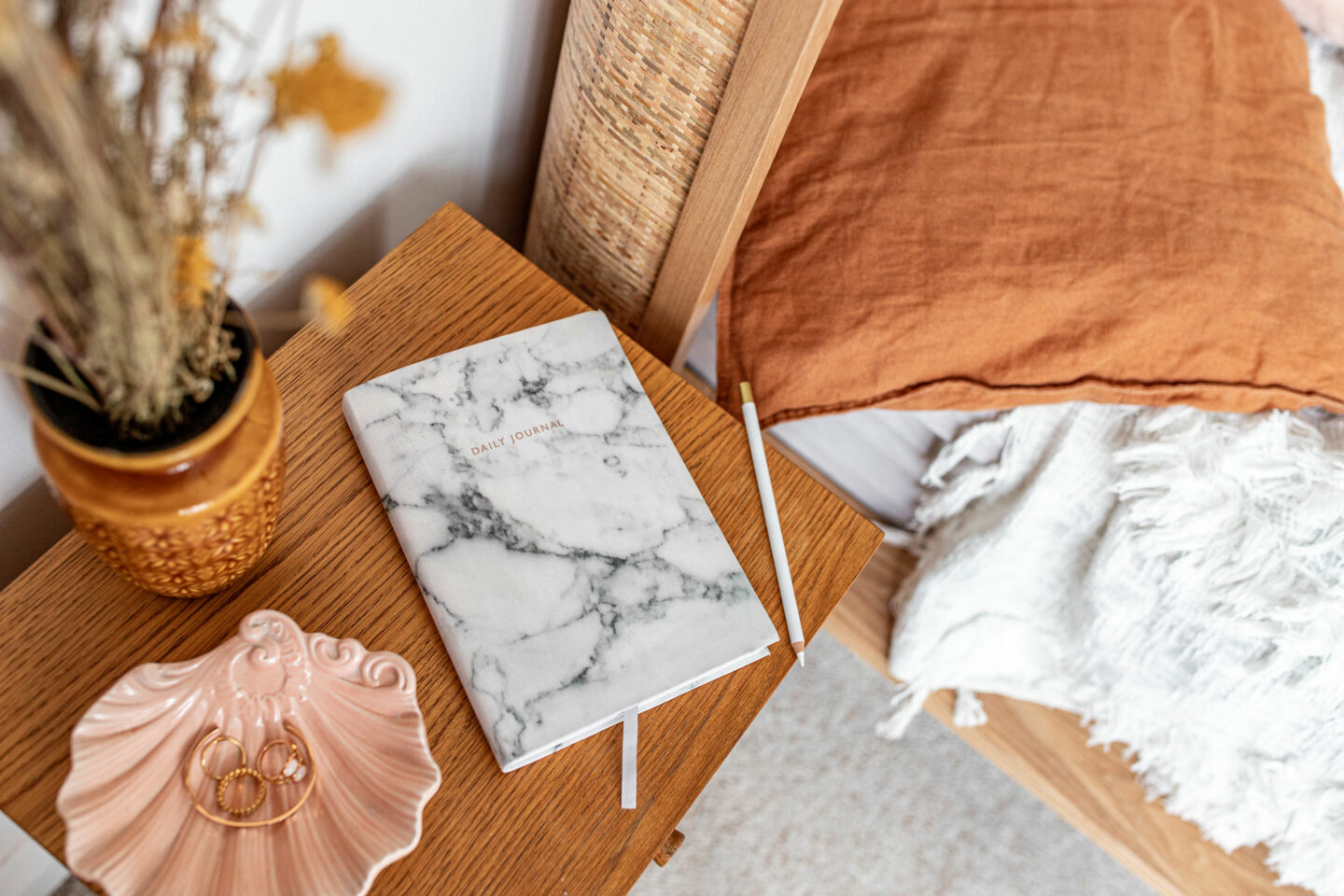
10. Write it down
I love to keep a notebook on my bedside table. Previously because I would always get hit with a design idea late in the evening (inspiration strikes at the strangest of times) and I would have to jot it down, but nowadays it serves a whole different purpose. During your wind downtime, practice the art of letting it all out, on paper that is.
Write about any anxieties you experienced during that day, anything that made you angry or sad and how you could avoid those type of situations in the future. Putting your concerns and worries on paper will help you release any bad energy and you are much less likely to ponder over your worries and therefore clear your mind for a good night’s sleep. What’s done is done.
In the morning, grab that same notebook again and turn a new page (quite literally) and write down three things you’re grateful for. It’s no secret that showing gratitude is good for you. Regular journaling has been proven to improve your well-being, increase your self-esteem, helps you sleep better and all-round makes you a happier, more optimistic person.

Related:
Enjoyed this article? Read 5 ways to beat the Winter Blues.




